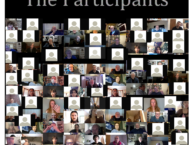A list of spring events sponsored by Clark University’s Higgins School of Humanities follows. These events are free and open to the public. For more information, call 508-793-7479.
Bland-Lee Lecture Series
Lecture
Wednesday, March 17, and Thursday, March 18; 4 p.m.
Higgins University Center, Grace Conference Room
Marilyn B. Young is a professor of History at New York University, where she teaches courses on the history of U.S. foreign policy; the politics and culture of post-war United States; the history of modern China; the history and culture of Vietnam; and Third World women and gender. Young’s most recent book is “Bombing Civilians: A Twentieth-Century History” (2009). This event is co-sponsored by the History Department.
Philosophy Lecture Series
Lecture
Wednesday, March 24; 6 p.m.
“The Separation of Moral Power”
Higgins University Center, Lurie Conference Room
Our moral self-governance employs three distinct powers of practical reason: the moral legislative power of rule-making, the moral executive power of discretion, and the moral judicial power of adjudicating rival claims. Our dominant moral theories—teleological, deontological, juridical—speak for these powers. The effort to make one of these to be supreme results in various sorts of tyranny, such as the tyranny of rules, the tyranny of distinction, and the tyranny of expediency. Many of the distortions of moral theory result from such abuses of power. We should abandon the project of defending one and attacking the others, and instead support the moral checks and balances—within individual moral psychology and between individuals and their moral communities—that help us to make the most of our ethical aptitudes and accents.
Visiting Professor Charles Wesley DeMarco will discuss how “The Separation of Moral Powers” applies to moral controversy a strategy that has proven its practical worth: division of basic functions with mutual checks. A simple procedure relates rival approaches, situates individual moral self-governance in social moral community, and defuses the priority claims of dominant moral theories.
Visiting Artist Lecture
Sculpture/Public Art Installations
Thursday, March 25; noon
Razzo Hall, Traina Center for the Arts
Ralph Helmick creates sculptures and installations throughout the United States while maintaining his studio in Newton, Mass. Among his many awards is a National Endowment for the Arts / New England Foundation for the Arts Fellowship, and numerous design honors for his public artwork. He has taught at the School of the Museum of Fine Arts, Boston and at colleges and universities across the U.S.
Helmick obtained a bachelor of arts in American Studies from the University of Michigan, attended the Skowhegan School of Painting and Sculpture in Maine, and received an MFA in Sculpture from the School of the Museum of Fine Arts, Boston and Tufts University, Medford, MA.
African American Intellectual Culture Series
Lecture
“Ida B. Wells and the Beginning of the Modern Civil Rights Movement”
Thursday, March 25; 7:30 p.m.
Dana Commons, 2nd Floor
The anti-lynching campaign of Ida B. Wells in the late nineteenth century created the foundation of the modern civil rights movement. Professor Paula Giddings of Smith College will discuss how this happened. Her recent book Ida: A Sword Among Lions is a sweeping narrative about a country and a crusader embroiled in the struggle against lynching: a practice that imperiled not only the lives of black men and women, but also a nation based on law and riven by race. Paula J. Giddings is the Elizabeth A. Woodson 1922 Professor in Afro-American Studies at Smith College and the author of “When and Where I Enter” and “In Search of Sisterhood.”
Lecture
“Open doors and unfinished business; some thoughts on the history of the ghost story”
Monday, April 5; 7 p.m.
Dana Commons
Simon Hay, assistant professor of English at Connecticut College will discuss the ways in which Victorian ghost stories aim to resolve key issues of their time: traumatic history, class and property, and empire. At the center of this exploration is the status of the realist novel. Hay shows that ghost stories are not only in dialogue with realism, but also that they reveal the underlying “ghostly” character of realism to begin with. Hay specializes in postcolonial theory and literature.
Higgins Faculty Series
Lecture and reception
“Forty years of China-Watching”
Wednesday, April 7; 4:30 p.m., reception to follow
Dana Commons
In his second week in graduate school in 1966, Paul Ropp decided to switch from European to Chinese history even though he had never previously studied China or the Chinese language. On the eve of his retirement, Ropp, the Andrea B. and Peter D. Klein Distinguished Professor of History at Clark, will reflect on that decision, on the course of his career as a Chinese historian, and on the changes he has witnessed in Chinese life and in Chinese-American relations over the past 44 years.
African American Intellectual Culture Series
Lecture
“Pain, Passion & Possibility; Inspired teaching & difficult subjects”
Thursday, April 8; 7:30 p.m.
Dana Commons
How do we have difficult conversations on painful subjects such as gender, racial and sexual inequality, discrimination and oppression in ways that enable, connect and empower students and ourselves? Professor Tricia Rose of Brown University will address this issue with particular attention to race and gender by drawing on Rose’s own scholarship, life and 16 years of university teaching.





